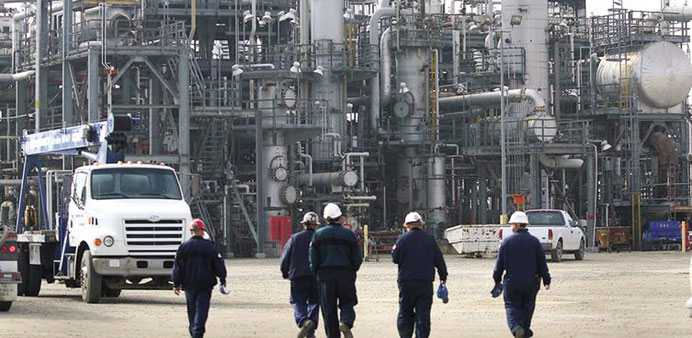The facility at independent refiner Alon USA Energy’s Bakersfield plant would increase crude offloading capacity to 140,000 bpd from its current 13,000 bpd and open up significant access to cheaper inland US and Canadian crudes.
The first crude-by-rail project at a California refinery is likely to win approval next month after more than a year of scrutiny, the head of the Kern County planning division told Reuters, and it could help reopen the shuttered plant.
The facility at independent refiner Alon USA Energy’s Bakersfield plant would increase crude offloading capacity to 140,000 barrels per day from its current 13,000 bpd and open up significant access to cheaper inland US and Canadian crudes.
Alon’s Bakersfield plant is in Kern County, home to about 65% of all California oil production, where crude has been produced for more than a century.
Alon shut the Bakersfield refinery in late 2012 because its reliance on more expensive imports and lack of access to other crudes without significant rail rendered the plant unprofitable.
Other California refiners also struggle with profitability because of reliance on expensive imported crude and costly fuel manufacturing regulations in the biggest gasoline market in the country.
“We’re supportive of what Alon is doing with this refinery,” said Lorelei Oviatt, director of the county’s planning and community development department. “This refinery is not operating at full capacity. We would like to see this refinery operating at full capacity.”
The Alon project is among several proposed at California refineries, some of which face growing opposition in light of a spate of crude train crashes in the past year as the US oil boom sent amounts of crude moving by train soaring.
The worst by far was in Quebec in July last year when a runaway crude train exploded in a the town of Lac-Megantic, killing 47 people.
Several California refiners, largely isolated by the Rocky Mountains from growing cheap bounty from US oilfields in Texas, North Dakota and in Canada, want to tap those sources via rail because no major pipelines carry crude from those areas into the Golden State, nor are any planned.
More than half of the 1.7mn barrels of crude processed by California refiners each day is imported.
But proposals have faced lengthy delays for comprehensive environmental reviews, public input, and revisions.
Valero Energy Corp, the largest US refiner, postponed its plans to rail crude to its San Francisco-area refinery because of such delays, and withdrew permit applications for a similar project at its Los Angeles plant.
Kinder Morgan Energy Partners operates the state’s most substantial oil-by-rail facility at a terminal in Richmond, which handles up to 72,000 bpd. Local planners last year approved, without an environmental review, a revised ethanol offloading permit to allow the terminal to handle crude. But opponents are suing to temporarily shut it down and force that kind of review.
Tesoro Corp faces similar growing opposition for a 360,000-bpd railport project in southwest Washington state that could move railed-in crude to California refineries by tanker.
That could let California refiners — which includes Tesoro’s Los Angeles-area plant — replace more than 40% of more expensive imported oil with North American crudes if all of it were shipped to the state.
Alon is considering possibly leaving the refinery shut and running the facility as a rail and logistics terminal, but the company has yet to decide that issue. If the refinery remains shut, the rail operation would be similar to a separate 70,000-bpd oil-by-rail facility Plains All American plans to open in October. That project was approved two years ago before it was acquired by Plains.
Bakersfield sits in the centre of the state’s oil production where the oil industry is long established. Plains executives have said its crude-friendly climate and existing infrastructure make the area more attractive for such projects.
“I think Bakersfield is probably the best place to build a rail facility in California, because it’s not sitting in San Francisco or LA, and it has access to pipes going north and south. It just seems like it’s going to be a struggle to develop rail in other locations,” Plains’ chief operating officer Harry Pefanis told analysts in May.
Alon had hoped to have its Bakersfield rail project up and running by the end of 2013, but it, like others in the state, underwent a lengthy environmental review and public comment.
The director of planning and community development, Oviatt, said the department had considered all issues during that review, including safety and spill preparedness in a longtime oil town.
Now the project is slated to go before the county’s board of supervisors for a vote at a September 9 public hearing. Oviatt, who is not one of the five members of the board, said she expected a final decision at that time.
The planning department has signed off on it, and Oviatt said the board tended to be supportive of business.
“I can’t say how the board would vote, but I do believe that given their business-friendly attitude, they’re going to take all of this into serious consideration.”

